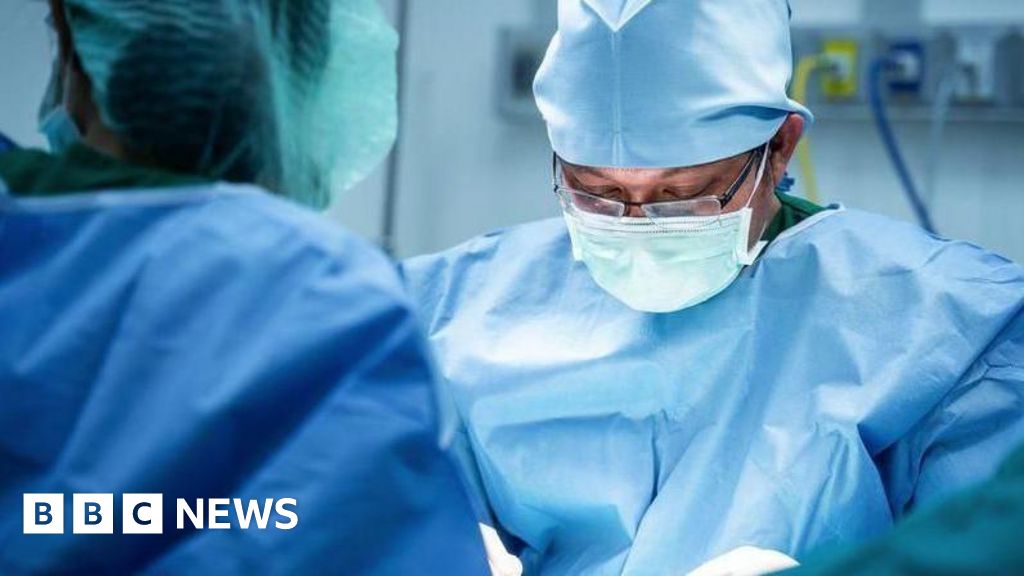ARTICLE AD BOX
 Image source, Shane Meenan
Image source, Shane Meenan
Shannon Meenan Browse was 32 when she died in August after complications arising from weight-loss surgery abroad, her father says
A father whose daughter died after travelling to Turkey for weight-loss surgery has urged people to think again before doing the same.
Shannon Meenan Browse from Londonderry was 32 when she died in August.
The mother-of-four travelled for a gastric sleeve operation 18 months ago but, according to her father, got sick almost straight away.
Shane Meenan said his daughter could not keep any food down in the wake of the operation.
He said the illness got so bad her teeth began to rot due to constant vomiting.
The family were told she died in Altnagelvin Hospital from "malnutrition due to gastric sleeve".
Dr Nicola Herron, a Derry-based GP, said the experience of Ms Meenan Browse and her family was "beyond heart-breaking", adding that doctors in Northern Ireland were becoming increasingly concerned about people travelling abroad for surgery.
'Lost my heart and soul'
A BBC investigation in March found that seven British patients who travelled to Turkey for weight-loss surgery died after operations there, while others returned home with serious health issues.
"The professionals here are sometimes at a loss as to how to look after people who have come back after this major surgery - because this is a specialist area. That is very worrying," Dr Herron said.
Most people, she added, don't realise just how serious the surgery can be.
Mr Meenan, meanwhile, told BBC Radio Foyle, that his daughter's death had lost him his heart and soul.
"She left behind four beautiful children and we have to be strong now for them."
What is weight loss surgery?
The two most common types of weight loss surgery are:
- Sleeve gastrectomy or gastric bypass, where some of the stomach is removed or the digestive system is re-routed past most of the stomach
- Gastric band, where a band is used to reduce the size of the stomach so a smaller amount of food is required to make someone feel full
"A sleeve gastrectomy is where a large part of the stomach is removed so it's much smaller than it was before," the NHS website says.
"This means you cannot eat as much as you could before surgery and you'll feel full sooner."
Risks associated with this type of surgery can include difficulty swallowing, vomiting and, in some cases, serious illness and death.
Recalling his daughter's ordeal, Mr Meenan said she couldn't keep her vitamins - nor anything else - down.
"As each day passed, she was getting sicker and sicker."
Mr Meenan said the only food his daughter could eat without throwing up was broth from ready-made noodles.
"She was getting very sick because all she was doing was throwing up and sleeping - that's all she could do," he said.
Ms Meenan Browse soon needed emergency surgery, he said.
"We were told the malnutrition affected her liver and killed her liver... then she got sicker again and her kidneys stopped working," he said.
"They then phoned us and told us she was dying and there was nothing they could do and all the machines were switched off."
Now, he wants others who are thinking about travelling for surgery abroad to know that it is about more than "just paying the money and booking in and getting it".
'Stringent criteria'
Similar surgery, if undertaken by the NHS, has very stringent criteria, Dr Herron said.
That includes that the patient's body mass index (BMI) is more than 40, which is classed as morbidly obese.
The majority of patients who travel for operations don't have a BMI that high, said Dr Herron.
"So therefore the risk they are taking far outweighs the benefits to their health of having this surgery."
Dr Herron added that people should stop and think before booking themselves in abroad for these types of operations.
If you, or someone you know, have been affected by any of the issues or topics covered in this story, you can visit BBC Action Line to find information and organisations that can help.

 1 year ago
41
1 year ago
41








 English (US) ·
English (US) ·